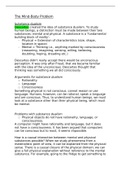The Mind-Body Problem
Substance dualism
Descartes created the idea of substance dualism. To study
human beings, a distinction must be made between their two
substances: mental and physical. A substance is a ‘fundamental
building block of reality’:
- Physical = Extension of characteristics (size, shape,
location in space)
- Mental = Thinking i.e., anything marked by consciousness
(reasoning, imagining, sensing, willing, believing,
doubting, hoping, dreading etc.)
Descartes didn’t really accept there would be unconscious
perception. It was only after Freud, that we became familiar
with the idea of the unconscious. Descartes thought that
thinking was something we all did consciously.
Arguments for substance dualism
o Rationality
o Language
o Consciousness
Something physical is not conscious, cannot reason or use
language. Humans, however, can be rational, speak a language
and are conscious. Thus, to understand human beings, we must
look at a substance other than their physical being, which must
be mental.
Problems with substance dualism
o Physical objects do not have rationality, language, or
consciousness.
A computer might have rationality and language, but it does
not have a consciousness. It has been argued that computers
can be conscious but to most, it seems impossible.
How is a causal interaction between mental and physical
substances possible? When we study phenomena from a
materialistic point of view, it can be explained from the physical
sense. There is a causal closure of the physical domain; we can
give a full physical explanation without reference to the mental
substance. For example, going to the fridge to get something to
, eat. This does not require looking into a mental state or the
mental realm for an explanation. It can be explained by
mentioning the mental state, i.e., being hungry. For many
scientists, there is another explanation that looks at human
behaviour: the human muscles are activated to walk to the
fridge. This does not appeal to the mental state. So, if we have
two different explanations, how are they related?
For many scientists, it is not so clear that we need the mental
explanation at all. If a full explanation can be given by referring
to material causes and effects, what is the use of referring to
the mental state?
Methodological problems
According to Descartes, we know our own mind by means of
introspection (the examination or observation of one's own
mental and emotional processes). We are directly aware of our
own mental states, but we need to infer the mental states of
others based on their behaviour. Is there indeed an asymmetry
between how we know ourselves and how we know others? Is
my knowledge of my own mental state indeed more certain?
How reliable is introspection as a method?
Descartes appeal to introspection has become extremely
problematic, it is no longer seen as a reliable way of
understanding beliefs and desires. We now understand that
people can be completely misguided about how they are
feeling.
William James said that ‘introspective observation is what we
have to rely on first and foremost and always. The word
introspection need hardly be defined. IT means, of course, the
looking into our own minds and reporting what we are there to
discover. Introspection is difficult and fallible; and the difficulty
is simply that of all observation of whatever kind.
He is suggesting that perception as such is difficult, and
introspection is no different. James argued that introspection is
the method of psychology. Psychology has been built on the
idea of introspection. Is this true? Introspection might be
argued to be much more difficult as we can be subject to our
own biases. Normal perception can overcome bias by





